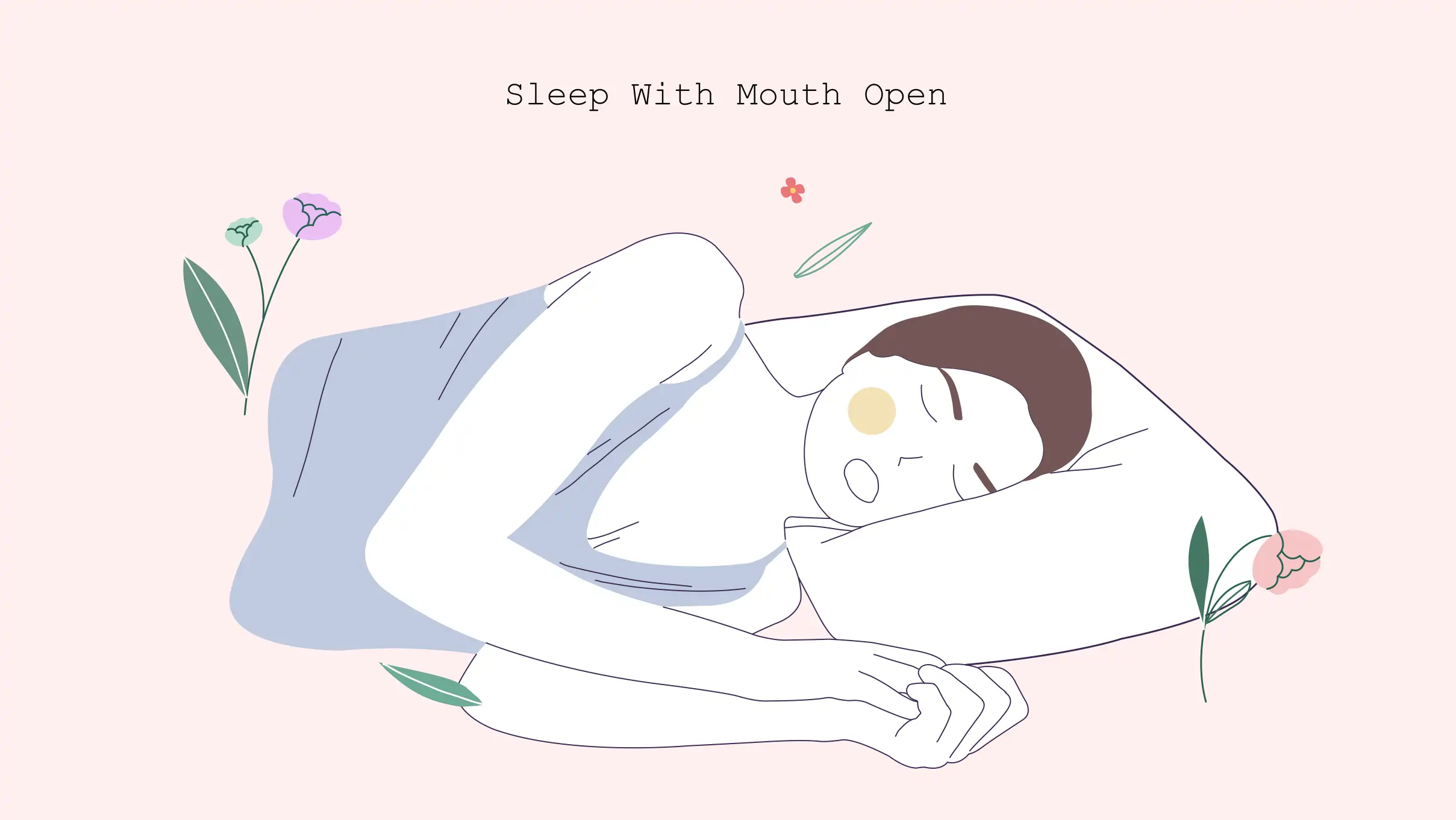Is Sleeping With Your Mouth Open Dangerous
Written by


Different people have different sleeping habits, and keeping their mouths open is one of them. Though experts tend to disagree, most people who sleep with open mouths do not consider it a big deal. However, research suggests that sleeping with the mouth open, or mouth breathing as it is commonly referred to, can have deeply adverse health effects.
This article aims to educate readers about mouth breathing, its causes and effects, and the best ways to solve the problems.
Nose Breathing Vs. Mouth Breathing
When people breathe through their noses, it naturally filters out any small particles or pollutants in the air. In addition, nasal breathing produces nitric oxide, which increases the ability of the lungs to absorb oxygen and transport it through the body. Breathing through the nose also strengthens the immune system and keeps the bronchial tubes and lungs hydrated. It is also beneficial for ensuring regenerative sleep.
Sleeping with an open mouth is considered an improper way of breathing adopted by the body to overcome any hindrances in normal nasal breathing. It is often the cause of various health issues related to dental health and sleep problems. That is why mouth breathers should seek appropriate solutions for the problem soon.
What Causes Mouth Breathing
The question, “why do I sleep with my mouth open?” has several answers. People suffering from the problem of inflamed nasal tissue or narrow airways may start breathing through their mouth. Sleep apnea, nasal congestion, and deviated septum are other common causes of mouth breathing. The growth of polyps and tumours in the nasal passage may also cause people to sleep with open mouths.
Effects Of Sleeping With Your Mouth Open
Sleeping with mouth open is not normal and has a wide range of health consequences which include the following:
- Gum disease: The drying up of saliva due to mouth breathing prevents the self-cleaning of unwanted acids, which, in turn, causes gum disease.
- Plaque accumulation: When the mouth does not have enough saliva, the plaque is not self-cleaned, resulting in its accumulation and tooth damage.
- Tooth decay: Breathing through the mouth causes the saliva to dry up, which promotes bacterial growth, causing tooth decay.
- Poor dentofacial development in children: Mouth breathing impacts the shape of the dental arches and the position of the teeth in children leading to facial deformity.
- Bad breath: When people breathe through the mouth, the quantity of saliva reduces. This causes a decline in the mouth’s ability to self-clean, leading to bad breath.
- Obstructive sleep apnea: Sleeping with the mouth open results in blocked airways and disrupting normal breathing during sleep.
- Cardiovascular disease: Mouth breathers do not get enough oxygen in their lungs which puts pressure on the cardiovascular system and leads to related health issues.
- Type 2 diabetes: Sleep disruptions can impact insulin secretion in the body, increasing the blood glucose levels and enhancing the risk of Type 2 diabetes.
- Liver problems: The decline in the quality and quantity of sleep due to mouth breathing increases the risk of liver problems significantly.
- Depression: People who sleep with open mouths often experience an increase in their stress and anxiety levels, the primary causes of depression.
- Infertility: The oxidative stress caused by lack of enough oxygen during sleep is known to cause a decline in male fertility.
- Brain abnormalities and cognitive impairment: People habitual of mouth breathing find it difficult to remember things or experience a decline in their brain functioning.
How To Stop Sleeping With Your Mouth Open
The key to avoiding the negative health consequences of mouth breathing is learning how to stop sleeping with mouth open. The following methods can prove beneficial in this context.
- Oral appliances: Oral appliances help to widen and reshape the palate and the airways, making it easier for the users to breathe through the nose while sleeping.
- CPAP (continuous positive airway pressure) and other PAP machines: The PAP machines prevent the tongue and the soft tissues in the throat from collapsing and blocking airflow. For this, the machines pressurize the airways while the users sleep, enabling them to breathe normally through the nose.
- Tongue-tie treatment: People often breathe through the mouth when the tongue collapses back into the throat and blocks the airflow. The tongue-tie treatment uses tissue to connect the tongue to the floor of the mouth, keeping the airways open.
- Orthodontics: Orthodontic treatments like braces and invisible aligners or Invisalign prove effective in repositioning the jaw and teeth. It helps improve the airways’ shape for enhanced airflow, eliminating the need for users to breathe through their mouths.
- Mouth taping: If the jaw of the sleepers relaxes excessively while sleeping, it can force them to breathe through the mouth. In such situations, mouth taping can prove beneficial by keeping the lips sealed to prevent the mouth from opening for breathing.
- Myofunctional therapy: Myofunctional therapy involves training the throat and mouth muscles of the patients for proper working. This physical therapy is imparted by professional therapists and helps to keep the airways of the sleepers open as they sleep.
- Tonsil or adenoid removal: Enlarged adenoids and tonsils can also constrict people’s airways and force mouth breathing. Removing the excess adenoid and tonsil tissues surgically can help resolve the problem and open the airways.
- Nasal decongestants: Nasal congestion blocks the airways and prevents people from breathing through the nose. Using oral and nasal decongestants and sprays helps clear the congestion in the airways and promotes nasal breathing.
- Antihistamines: The congestion in nasal passages caused by allergies is another primary reason that forces people to breathe through the mouth. Treating the condition with the help of antihistamines has proven to be an effective way to promote nasal breathing.
- Air filtration: The pollutants and allergens present in the air can clog the nasal airways making it difficult for people to breathe normally through the nose. Using air filtration systems helps these allergens and pollutants and thus helps reduce nasal congestion and prevent mouth breathing.
Conclusion
Contrary to popular belief, mouth breathing is a major cause of concern. Being aware of what happens when you sleep with your mouth open is essential for people to take corrective measures to resolve the problem. It is also important to learn about the causes of mouth breathing for its proper treatment. Using the right appliances and treatments helps to keep the nasal airways open and eliminates the need for people to breathe through their mouths. Also, it is best to consult your doctor rather than making such decisions yourself.
FAQs
How do you become a nose breather?
You can leave written reminders for yourself if you’re having trouble breaking the habit of breathing through your nose. To remind yourself to breathe through your nose, write the word “breathing” on sticky notes and stick them inside of books or on your computer and practice nose-clearing techniques.
How can I force my nose to breathe at night?
Purchase a pillow or wedge that raises your head and upper back at a 30 to 60-degree angle. This should encourage breathing through your nose while you sleep and help you keep your mouth shut.
Can mouth breathing change your face?
Mouth breathing has an impact on the body as a whole. Mouth breathing can severely harm a growing child’s facial bones and muscles. Mouth breathing can result in facial malformations that are frequently too severe to be treated by orthodontics. These people might need jaw surgery in the future.
people like this article
Written by








